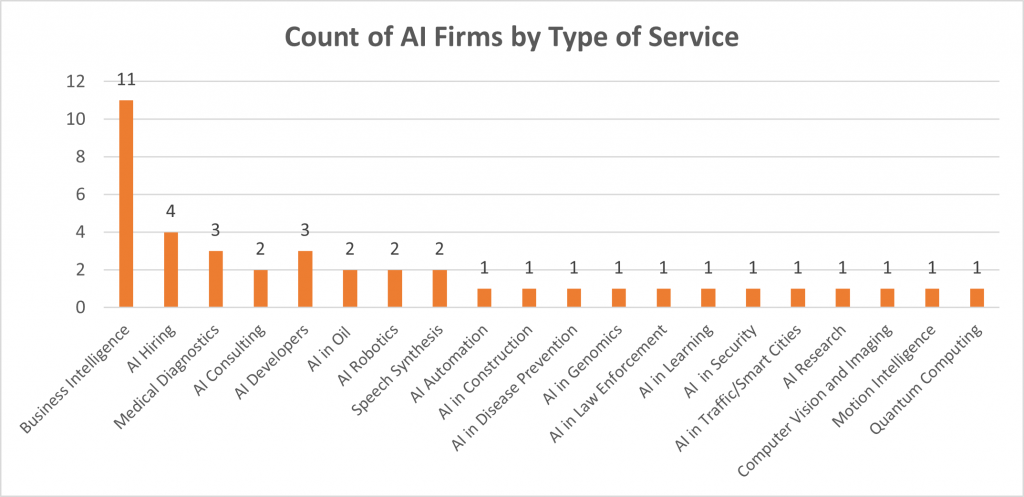Environmental Scan: Addressing Inclusionary Practice in Canadian AI Firms
This article provides an overview of key findings from an environmental scan conducted by the We Count team in May 2020. The scan relied on information available through online sources to explore how data ethics are being taught, expressed, and implemented within Canada by three stakeholders in the data ecosystem: Postsecondary education (PSE) Institutions, Data Service Providers, and AI Firms.
The AI Firm portion of the environmental scan identified 40 Canadian AI Firms and aimed to answer the following question: What is the main messaging communicated by popular AI companies?
Highlights
- 16 of the 40 identified AI firms address ethical concerns
- 9 of the 40 identified AI firms address issues of fairness or inclusion
A focus on business needs
A considerable amount of identified AI Firms provide clients with services that fulfil business needs, such as providing business intelligence and aiding in the hiring process. The chart below details the types of services provided by the identified AI Firms.

Examples of company messaging
Many websites position AI as a benefit and solution to human limitations:
“Our AI enablement tools save you time in the necessary steps of labelling data and training AI models.”
— Element AI
“We know the complexities of dermatology can be daunting, so we’ve developed a tool to provide you with an instant second opinion.”
— Triage
“Use your humans wisely, automate with ADA.”
— ADA
“4x more accurate than traditional selection methods at matching people to jobs where they thrive.”
— Plum.io
Examples that address fairness and inclusion
Element AI: The company’s page on responsibility communicates a proactive approach of “putting our own house in order first” and actively contributing to the development of ethical AI.
Plum.io: Ultraviolet, the company’s proprietary recruitment and talent selection AI is stated to account for varying types of ability to not have an adverse impact on protected groups.
Coveo: An article published on the company’s website argues for a human-driven approach to AI. The article characterizes AI as not being immune from error due to biases in data, algorithms, and interaction.
Stradigi AI: In 2019, Stradigi AI appointed futurist and tech entrepreneur will.i.am as AI Advisor, Bias and Ethics to help create AI products that empower people.
Omnia AI (Deloitte): Published a report on Canada’s AI imperative that recommends taking into account inclusion and fairness in AI development.
Accenture: Provides AI strategy consulting that takes into account AI ethics and recently published a research report that describes how an inclusive approach to algorithm design helps in reducing societal harm.
PWC: Provides AI strategy consulting services that assess the ethical nature of AI firms and helps them test for bias and fairness.
Aversan Labs: Produces a smart personal detection device that relies on ultrasonic wave technology to assist the visually impaired in their day to day tasks.
Aerial Technologies: Uses AI along with motion detection to provide noninvasive eldercare monitoring solutions.
Takeaways
- Business needs (intelligence and hiring) make up the largest category of AI firms
- Majority of website messaging positions AI as a benefit and solution to human limitations
- Canadian AI firms may be beginning to acknowledge the importance of fairness and inclusion in AI
Resources
We are pleased to share the findings of this scan through the following accessible formats:
- Word: Ethical AI in the Data Ecosystem
- PDF: Ethical AI in the Data Ecosystem
- PowerPoint: Ethical AI in the Data Ecosystem (with audio)
- YouTube video: Ethical AI in the Data Ecosystem
We have also compiled lists of stakeholders identified during the scan for their proactive stance regarding data ethics and ethical AI: